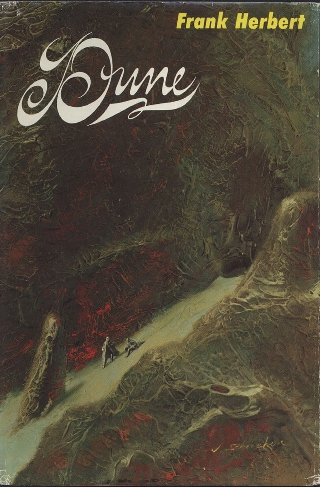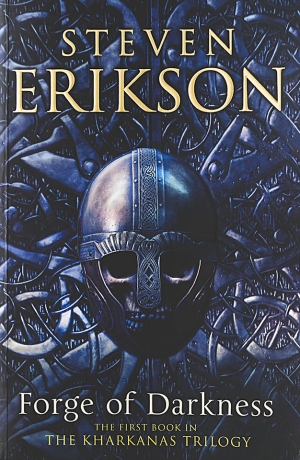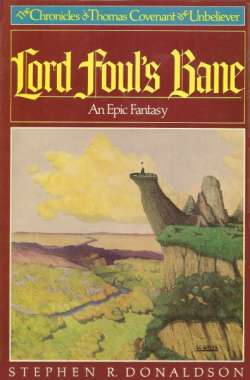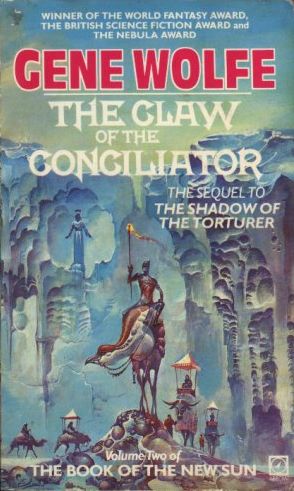
She sighed. “Thufir, I want you to examine your own emotional involvement in this. The natural human’s an animal without logic. Your projections of logic onto all affairs is unnatural, but suffered to continue for its usefulness. You’re the embodiment of logic –a Mentat. Yet, your problem solutions are concepts that, in a very real sense, are projected outside yourself, there to be studied and rolled around, examined from all sides.”
“You think now to teach me my trade?” he asked, and he did not try to hide the disdain in his voice.
“Anything outside yourself, this you can see and apply your logic to it,” she said. “But it’s a human trait that when we encounter personal problems, those things most deeply personal are the most difficult to bring out for our logic to scan. We tend to flounder around, blaming everything but the actual, deep-seated thing that’s really chewing on us.”
Reviewing a book that is almost fifty years old is not so easy since it’s even harder to find something interesting or original to say. But again I follow my own patterns and it seems that what interests me isn’t what other people seem to enjoy discussing. It’s curious that I’ve had a copy of “Dune”, in my own language, for more than a decade but decided to start reading it only a couple of months ago, after having re-bought it in English (and a very nice, used since it’s out of print, 1979 Gollancz hardcover omnibus that at 912 pages collects the first trilogy cycle: Dune, Dune Messiah, Children of Dune). After MCN wrote about it on Twitter enough to spark my interest, what pushed me to buy the book and place it on top of my reading queue was all the complaints about the dense philosophy and mythological or religious themes in the books. As with Tomas Covenant, what interests me here isn’t Dune, the popular book, but the cycle, the overall arc. One single line in a review won my enthusiasm:
“Listen carefully, Feyd,” the Baron said. “Observe the plans within plans within plans.”
That line becomes a formula, I found “a feint within a feint within a feint”, “tricks within tricks within tricks”, “treachery within treachery within treachery”, till the much more poetic and meaningful “blue within blue within blue”. Or the most generic “wheels within wheels within wheels”. What’s important for me is recognizing this not as just a trope, but a rather telling hint of the deeper theme that runs through this book and that held my attention all the way through. While reading I kept wondering how much Herbert was conscious about what he was dealing with, or if he was simply tailing after an idea without fully grasping it. Wether he knew with clarity the answers, or if he was also searching for one himself. That pattern is one I recognize in other aspects even if it’s not explicitly quoted as in the formula:
“I was a friend of Jamis,” she said. “When the spirit of spirits within him saw the needs of truth, that spirit withdrew and spared my son.”
“Spirit of spirits within him”. Two aspects give enough power to this repeated pattern. And I’m certain that this represents the core of the book instead being just my own bias reading it (like a skewed interest to minor aspects) because it becomes more and more explicit in the book, becoming absolutely evident and dominant. The first is that the plot itself is built around a (post-modern) play with different frames. Mixing, maybe with too much freedom, between generic dichotomies like system and ambient, or more in general: inside and outside (internal and external, familiar and alien). The second aspect is about the reflexivity. The “spirit of spirits within” refers to a level of “meta-history”. In Jungian terms you can call it “collective unconscious”, or, if you don’t like the metaphysics in it, just the ultimate direction of evolutionary life, experimenting constantly, finding better solutions. The “meta-history” is that part of history that can’t be seen, the overall flow of life that isn’t lead by a consciousness. While the reflexivity of this machine makes me think to consciousness itself, whose most defining property is reflexivity. Reflexivity that is itself a play with system and ambient, observer and observation. The “strange loops” described in “Gödel, Escher, Bach” (the first quote up there in this review refers to this).
THIS is what Dune is about, yet you don’t usually see anything resembling to this mentioned in reviews of the book. It’s the undercurrent that runs through it, gives it its life force. Everything else is a metaphorical surface level, coalescing into “plot”. Interesting characters, politics, villains, battles of wits, wars for power, until the resolution at the end. Even without grasping that undercurrent the book can be enjoyable and read without feeling you’re missing the point. The philosophy dictates the structure while still being “optional”. But nowadays the book probably lost its polish about innovative ideas (or what we horribly call “worldbuilding”) or even about the well paced and surprising plot.
In a recent discussion on the forums I noticed many readers complaining either about the writing style or about the characters. The writing mostly because Herbert goes “against the grain” of what nowadays is the established convention, the third person limited perspective where you see a whole scene through a single PoV. Whereas Herbert smoothly switches PoV, without indentation, many times within the same scene. So one line you can be in the head of some character, with focus on its own peculiar biases, and the line after into another head, with its own bias. So this could be a problem, even if I personally had no problems with this stylistic choice and I think it serves the point since Herbert wants to enhance the contrast of those PoVs, putting emphasis on each respective bias. Then there are the complaints about characterization. My opinion is that the novel is filled with characters whose role in the plot can be stereotypical, but that become quite interesting. It’s no superficial characterization and the psychology is filled with very subtle details that play important roles. They have depth and a type of complexity that is very specific to this book, especially in the way small details influence reactions of other characters, so there’s so much attention describing tones of voice or postures, for example, always in a meaningful way instead of superfluous incidental detail. But the major complaint that many readers have is in general about characters that feel distant and alien, especially about the protagonist and his mother. Again this is more a personal reaction and bias, because I’d say it’s a fault if the writer aimed for the opposite effect, but those characters ARE MEANT to be alien (“the Voice from the Outer World”). Paul Atreides becomes what I consider indistinguishable from god, and his mother has also access to these sort of metaphysical powers that return to the undercurrent I mentioned above.
It’s curious because the book couldn’t be more actual with the stuff that is getting my attention recently, like the Blind Brain Theory that Bakker is developing and writing about on his blog, and broader considerations about mythology, religion and how human consciousness relates to all this. And again, this is a book, and a series, that shares very similar patterns with what I said about Thomas Covenant. Again there are two levels to the story. Again there are Matrix-like constructions of revelations and simulated worlds. Epiphanies that drive the narrative more than straightforward plot. Most of it, in fact, could be considered sloppy since most of the heavy lifting is caused by “magic” powers. If you don’t engage with the philosophical level, the plot may appear as rather artificial and “deus-ex-machina” driven, with frequent external interventions that nudge the plot in strategic and convenient directions. But it’s, ironically, the point. Not an unintended effect, Paul is exactly, literally Deus-ex-machina. Or, if you let me, Deus In Machina, since it’s a god right into the machine. What I mentioned above about the play with different frames, turning around inside and outside, the exquisitely post-modern defiance of boundaries of any kind, fourth wall and everything. All this is Paul. It’s what happens when a god is subject to his own story. A god that is at the same time “inside” his creation, and “outside” it, looking in, continuously manipulating.
On this “violation” of rules is built the whole structure (the ideal of a book, any book, is, like the physical universe, a closed system, without a God who can constantly tamper with it, which is also the canon of a “good” story). It’s brilliant and extremely interesting, but it can also be clunky because then Herbert had to put an artificial limit, maybe not fully understanding or being able to deal with this otherworldly thing. There’s a limit to Paul’s prescient abilities in order to not completely destroy the story. Limits that are clumsy, not so well described and defined. Paul can see all possible futures, but sometimes they aren’t very clear, sometimes they shifts in deceptive ways, and sometimes there are pivotal moments that center on him, that he can’t predict, and so restoring some suspense and uncertain outcomes. It’s a so ambitious goal dealing with these themes, but it also isn’t extremely convincing in the end. As far as I know the pretense of science only stays as a pretense since Paul’s powers become more magical and metaphysical than something plausible. His prescience doesn’t seem limited by what makes sense (aka: the range of information he can plausibly have access to) while at other times he’s able to foresee futures that should be completely out of his reach. It’s prescience (that wants to be) generated by strict calculation. So it shouldn’t be magical, but just access and ability to process an inhuman amount of information. Yet he seems to see stuff that simply he shouldn’t be able to from his perspective, even with his calculation powers. So what he can or cannot do sometimes follows more the necessities of the plot, than something that makes sense.
As I said I was going to write about aspects of the book I don’t see discussed often, and yet they aren’t sidetracks, but represent the real life force that I suspect comes even more to the surface with the rest of the series. But I also wanted to mention another curious aspect I noticed and that is about how much of the core plot in the Wheel of Time is ripped out straight of “Dune”. I already vaguely knew about this but thought it was mostly limited to the analogies between the Aiel population in WoT and the Fremen of Dune, but that’s almost a trivial detail compared to the rest. What WoT copies as its own core and adjusts is the whole deal with the Dragon Reborn, Kwisatz Haderach. Most of the elements running around that idea return, adapted in different ways, in the WoT. The order of the Aes Sedai mimics the Bene Gesserit, including their shadow government and long term manipulations. The breeding program in Dune is adapted in a form of reincarnation in WoT that retains a similar level of meta-story, as well as the powers of the Dragon Reborn / Kwisatz Haderach that can bring salvation or destruction, that become the very nexus (Ta’veren) of the weaving of time. The relationship between Paul and his manipulative (but not uncaring) mother Jessica at least partially inspires the struggles between Rand and Moraine. And then even the split between genders and its relationship with the magic/metaphysical aspect. Aes Sedai, as Bene Gesserit, are only females, and the Bene Gesserit task is to find/produce a “man who can channel”, or, rather, sharing Bene Gesserit predictive and controlling powers. Initial reactions of Rand/Paul to the cage of his destiny are also similar: “I’m a monster! He thought. A freak!”, and share similar risks: the threat of going insane. You can dig as much as you want and find plenty of analogies. The difference is that Jordan pushes things to the surface, makes them more accessible, but also less meaningful and more hollow, so that the strongest themes remain only pale ghosts. Dune is to my eyes a much more complex, adult and mature version of those themes, without getting too enamored of trivialities, but that’s also where WoT gets its more familiar and likeable characters, and more directly engaging plot.
Sadly now this series joins my already unmanageable reading cycle. For me the fun begins now that Dune is over. I know that most readers find all the other books far less interesting, but as you can see my attention seem to go in completely different direction than the norm. But I have a gazillion of series in “medias res” that now have a priority, even if I wanted to start reading Dune Messiah right away (I actually started but I’ll force myself not to read more than 30 pages, also because it’s the book that has only about 150 in total).
P.S.
The third Appendix, “Report on Bene Gesserit Motives and Purposes”, is troubling since it reads like a list of plot holes. As far as I know (and I may be wrong) Herbert wrote Dune as a standalone and only later returned to it. This appendix is still part of the first book. So did I miss something in this book, or is this the hint that Herbert had a much larger plan already in his mind, or is it meant as just a pretense that there are larger, hidden motives but that actually don’t become manifest? Does he have the answers or is merely pretending to have them?





 An illness that entirely gets to represents his only identity (left), and the truth of the impossibility of hope. In that condition he viscerally knows his harsh reality, and he knows that delusions come in the form of fantastic narratives. Fantasy landscapes where all illnesses can be healed, a natural world manifesting itself as pure beauty. With his feet in these two radically different and opposite worlds, he is lacerated. Torn from the inside. And he leashes out with pure anger because he’s painfully aware of how these delusions of hope and health are mocking his true condition. If you, the reader, go into the story, then it’s the fantasy world coming alive and being real. But if you instead take this story out and make it true, then you feel how powerful it is, and how much unsustainable pain it delivers.
An illness that entirely gets to represents his only identity (left), and the truth of the impossibility of hope. In that condition he viscerally knows his harsh reality, and he knows that delusions come in the form of fantastic narratives. Fantasy landscapes where all illnesses can be healed, a natural world manifesting itself as pure beauty. With his feet in these two radically different and opposite worlds, he is lacerated. Torn from the inside. And he leashes out with pure anger because he’s painfully aware of how these delusions of hope and health are mocking his true condition. If you, the reader, go into the story, then it’s the fantasy world coming alive and being real. But if you instead take this story out and make it true, then you feel how powerful it is, and how much unsustainable pain it delivers.

